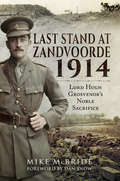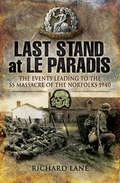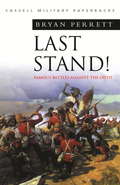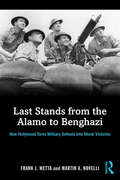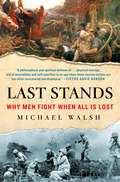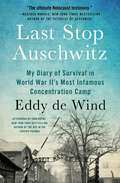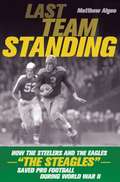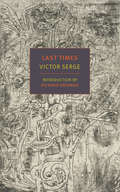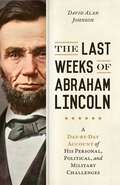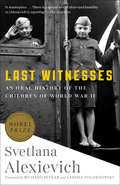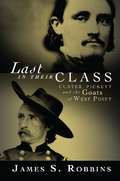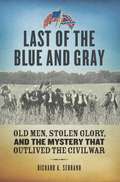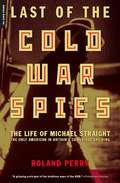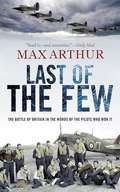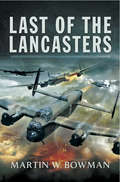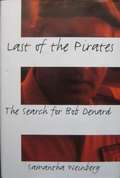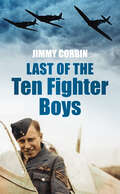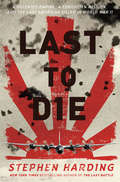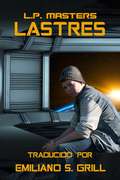- Table View
- List View
Last Stand at Zandvoorde, 1914: Lord Hugh Grosvenor's Noble Sacrifice
by Mike McBrideBeing the son of the Duke of Westminster, whose family traces its lineage back to 1066, Lord Hugh Grosvenor was destined to become a cavalry officer in the prestigious 1st Regiment of Life Guards. Using unpublished letters home and contemporary accounts Noble Sacrifice describes Lord Hughs embarkation for France and the early mounted encounters which halted the enemy onslaught against the contemptible little army. These led to the stalemate of trench warfare and found Lord Hugh and his Squadron holding out at Zandvoorde during the First Battle of Ypres 1914 and being annihilated by superior numbers of enemy forces in some of the most desperate fighting of the First World War. Due to the advances in military hardware, the war for Lord Hugh and his comrades marked a turning point in cavalry tactics.As well as being a dramatic account of Lord Hugh Grosvenors last stand, Noble Sacrifice is a very personal story of courage and self-sacrifice. This heroic yet tragic story has a mysterious twist. The bodies of Lord Hugh and his 100 soldiers were never found - it was as if they had never existed.
Last Stand at le Paradis: The Events Leading to the SS Massacre of the Norfolks 1940
by Richard LaneIn early September 1939, the 2nd Battalion Royal Norfolk Regiment were one of the first complete infantry units of the BEF to land in France.The first months of World War Two were relatively quiet but after deploying to the Maginot Line sector during January 1940 they came into contact with those Germans manning the West Wall or Siegfried Line. A patrol led by Captain Peter Barclay entered German territory and was attacked. As a result, the first decorations of the war were awarded. Barclay received the Military Cross and Lance-Corporal Davis the Military Medal while the remaining members of the patrol were mentioned in despatches.Two days later, the battalion suffered a tragic first when Lieutenant Patrick Everitt was mortally wounded while leading a daylight patrol. Everitt was the first British officer to be killed in action in the Second World War.When the Germans launched their offensive on 10 May, the BEF advanced to the River Dyle in Belgium. Within days the Allied Armies had been forced onto the back foot by the speed and ferocity of the German breakthrough. The Norfolks withdrew to the River Escaut where the BEF was to make a stand. On 21 May, the Company Sergeant Major George Gristock courageously destroyed some German machine-gun posts and won a posthumous Victoria Cross.As the Allies withdrew towards the Channel, the Norfolks were ordered to defend a section of the Canal Line between Bthune and Le Cornet Malo. Already down to around half strength, the Norfolks held their sector from 24 to 27 May. By the time the order was issued for them to withdraw, it was too late, Battalion HQ at Duries Farm, Le Paradis was surrounded and they had no alternative but to surrender, although C Company held out until the following morning.After the surrender, ninety-nine men of the Battalion were marched to a paddock where they were machine-gunned in cold blood by their SS captors. Miraculously, two men survived and were instrumental in bringing the SS officer responsible, Fritz Knoechlien, to justice after the war.When the remnants of the battalion reassembled in England, its strength was just five officers and 134 other ranks. The remainder had either been killed or captured as POWs.
Last Stand: Famous Battles Against The Odds (Cassell Military Classics Ser.)
by Bryan PerrettWhat do soldiers do when all is lost?They keep fighting! In this best-selling anthology, Bryan Perrett provides gripping accounts of close-quarter battles and hard fought victory against all the odds. His journey from Napoleonic Europe through to the Korean War highlights thirteen episodes of incredible bravery and sacrifice in unbelievable actions. The book begins with the gallant fight of Napoleon's Old Guard at Waterloo. It examines the famous actions at the Alamo; against the Zulus at Rorke's Drift; and 'the Bridge Too Far' at Arnhem. The adventure concludes with the desperate last stand of the Gloucesters at Imjin during the Korean War. Last Stand! is the breathtaking story of ultimate sacrifice and glorious victory.
Last Stand: Famous Battles Against The Odds (W&N Military)
by Bryan PerrettWhat do soldiers do when all is lost?They keep fighting! In this best-selling anthology, Bryan Perrett provides gripping accounts of close-quarter battles and hard fought victory against all the odds. His journey from Napoleonic Europe through to the Korean War highlights thirteen episodes of incredible bravery and sacrifice in unbelievable actions. The book begins with the gallant fight of Napoleon's Old Guard at Waterloo. It examines the famous actions at the Alamo; against the Zulus at Rorke's Drift; and 'the Bridge Too Far' at Arnhem. The adventure concludes with the desperate last stand of the Gloucesters at Imjin during the Korean War. Last Stand! is the breathtaking story of ultimate sacrifice and glorious victory.
Last Stands from the Alamo to Benghazi: How Hollywood Turns Military Defeats into Moral Victories
by Frank Wetta Martin NovelliLast Stands from the Alamo to Benghazi examines how filmmakers teach Americans about the country’s military past. Examining twenty-three representative war films and locating them in their cultural and military landscape, the authors argue that Hollywood’s view of American military history has evolved in two phases. The first phase, extending from the very beginnings of filmmaking to the Korean War, projected an essential patriotic triumphalism. The second phase, from the Korean and Vietnam Wars to the present, reflects a retreat from consensus and reflexive patriotism. In describing these phases, the authors address recurring themes such as the experience of war and combat, the image of the American war hero, race, gender, national myths, and more. With helpful film commentaries that extend the discussion through popular movie narratives, this book is essential for anyone interested in American military and film history.
Last Stands: Why Men Fight When All Is Lost
by Michael Walsh"A philosophical and spiritual defense of the premodern world, of the tragic view, of physical courage, and of masculinity and self-sacrifice in an age when those ancient virtues are too often caricatured and dismissed." —Victor Davis Hanson Award-winning author Michael Walsh celebrates the masculine attributes of heroism that forged American civilization and Western culture by exploring historical battles in which soldiers chose death over dishonor in Last Stands: Why Men Fight When All Is Lost.In our contemporary era, men are increasingly denied their heritage as warriors. A survival instinct that’s part of the human condition, the drive to wage war is natural. Without war, the United States would not exist. The technology that has eased manual labor, extended lifespans, and become an integral part of our lives and culture has often evolved from wartime scientific advancements. War is necessary to defend the social and political principles that define the virtues and freedoms of America and other Western nations. We should not be ashamed of the heroes who sacrificed their lives to build a better world. We should be honoring them.The son of a Korean War veteran of the Inchon landing and the battle of the Chosin Reservoir with the U.S. Marine Corps, Michael Walsh knows all about heroism, valor, and the call of duty that requires men to fight for something greater than themselves to protect their families, fellow countrymen, and most of all their fellow soldiers. In Last Stands, Walsh reveals the causes and outcomes of more than a dozen battles in which a small fighting force refused to surrender to a far larger force, often dying to the last man.From the Spartans’ defiance at Thermopylae and Roland’s epic defense of Charlemagne’s rear guard at Ronceveaux Pass, through Santa Anna’s siege of the Alamo defended by Davy Crockett and Jim Bowie to the skirmish at Little Big Horn between Crazy Horse’s Sioux nation and George Armstrong Custer’s Seventh Calvary, to the Soviets’ titanic struggle against the German Wehrmacht at Stalingrad, and more, Walsh reminds us all of the debt we owe to heroes willing to risk their lives against overwhelming odds—and how these sacrifices and battles are not only a part of military history but our common civilizational heritage.
Last Stop Auschwitz: My Story of Survival from within the Camp
by Eliazar de WindWritten in Auschwitz itself, this one-of-a-kind, minute-by-minute true account is a crucial historical testament to a Holocaust survivor's fight for his life at the largest extermination camp in Nazi Germany, translated for the first time ever into English. "We know that there is only one ending to this, only one liberation from this barbed wire hell: death." --Eddy de WindIn 1943, amidst the start of German occupation, Eddy de Wind worked as a doctor at Westerbork, a Dutch transit camp. His mother had been taken to this camp by Nazis but Eddy was assured by the Jewish Council she would be freed in exchange for his labor. He later found out she'd already been transferred to Auschwitz. While at Westerbork, he fell in love with a woman named Friedel and they married. One year later, they were transported to Auschwitz. Upon arrival, Friedel and Eddy were separated--Eddy forced to work as a medical assistant in one barrack, Friedel at the mercy of Nazi experimentation in a nearby block. Sneaking moments with his beloved and communicating whenever they could, Eddy longed for the day he could be free with Friedel...Written in the camp itself in the weeks following the Red Army's liberation of the camp, Last Stop Auschwitz is the raw, true account of Eddy's experiences at Auschwitz. In stunningly poetic prose, he provides unparalleled access to the horrors he faced in the concentration camp. Including photos from Eddy's life before, during, and after the Holocaust, this poignant memoir is at once a moving love story, a detailed portrayal of the atrocities of Auschwitz, and an intelligent consideration of the kind of behavior-both good and evil-people are capable of. Never before published in English, this book is a vital and enduring document: a testament to the strength of the human spirit, and a warning against the depths we can sink to when prejudice is given power
Last Stop Union Station: A Novel
by Sarah JamesMurder, movie stars, and mystery await those who climb aboard this cross-country train, inspired by the real-life history of the Hollywood Victory CaravanHollywood, 1942. Jacqueline Love's acting career is flailing. Suddenly on the wrong side of 40, parts are drying up, directors are calling her "difficult," and Humphrey Bogart has definitely stopped taking her calls. Desperate to cling to stardom, Jackie takes the only gig that will have her: the Hollywood Victory Caravan, a train full of movie stars crossing the country to fundraise for the war effort. Jackie wouldn't call herself patriotic, but with her life's work on the line, she'll do anything.When a fellow star dies on board, everyone assumes the death was a tragic accident–but Jackie isn't so sure. Stuck in Chicago's Union Station, Jackie enlists the help of Grace, one of the few women in the police force, to investigate. But "difficult" outside of a movie set is dangerous, and when the pair fall into a homegrown Nazi scheme, Jackie must ask herself what's more important: her career, or her country?
Last Stop Vienna: A Novel
by Andrew NagorskiGermany in the 1920s, in the early days of Hitler and the Nazi party, was a country plunging into darkness and violence. Andrew Nagorski has written the story of a doomed generation, of evil, hopelessness, sexual perversion and murder that set the stage for the ultimate destruction of a society. But in a stunning denouement, a young Nazi brownshirt, acting out of passion and revenge, changes the course of history.Karl Naumann, a German teenager who has lost his father and brother in World War I, has tried to find a place in a defeated, demoralized and anarchic Berlin. Impressed by the returning veterans who refuse to lay down their arms and fight running battles with communist revolutionaries, and alone and adrift on the streets, he is recruited to their cause and camaraderie. He is sent to Munich, where he works his way up the ranks to become one of Adolf Hitler's bodyguards, a storm trooper. The new movement is increasingly split between Hitler and rival leaders, including Karl's mentor, Otto Strasser, a real-life Nazi activist. As the schism within the party widens, the battles intensify and Hitler asserts his dominance, Karl must determine where his loyalty lies. He has fallen in love with a nurse, Sabine, whom he marries, but he is infatuated with Hitler's young niece, Geli Raubal, who is caught up in a deeply disturbing sexual relationship with her uncle. Obsessed by the seductive and elusive Geli, Karl is startled by what he sees through her of the dark core of Hitler's personality. When Geli finally summons up the courage to leave her uncle, it is too late. Soon after, she is found dead in their apartment, a gun in her hand, allegedly a suicide. Karl believes that Hitler has murdered her. He follows him to Geli's grave in Vienna where their final confrontation takes place. Last Stop Vienna presents a chilling and suspenseful look at what might have been.
Last Team Standing
by Matthew AlgeoDuring World War II, the national Football League faced a crisis unimaginable today: a shortage of players. By 1943, so many players were in the armed forces that the league was forced to fold one team (the Cleveland Rams) and merge two others: the Pittsburgh Steelers and the Philadelphia Eagles. Thus were the "Steagles” born. The Steagles included military draft rejects, a superstar lured out of retirement, and even a few active-duty servicemen who got leave for the games. Yet, somehow, this motley crew posted a winning record-the first in Eagles’ history and the second in Steelers’ history. A book about football, about life during the war, Last Team Standing is, above all, about those of the Greatest Generation who, against all odds, contributed to America’s war effort in the unlikeliest ways.
Last Times
by Victor SergeA story of displacement and resistance during the early days of the Nazi occupation of France.Last Times, Victor Serge&’s epic novel of the fall of France, is based—like much of his fiction—on firsthand experience. The author was an eyewitness to the last days of Paris in June 1940 and joined the chaotic mass exodus south to the unoccupied zone on foot with nothing but his manuscripts. He found himself trapped in Marseille under the Vichy government, a persecuted, stateless Russian, and participated in the early French Resistance before escaping on the last ship to the Americas in 1941.Exiled in Mexico City, Serge poured his recent experience into a fast-moving, gripping novel aimed at an American audience. The book begins in a near-deserted Paris abandoned by the government, the suburbs already noisy with gunfire. Serge&’s anti-fascist protagonists join the flood of refugees fleeing south on foot, in cars loaded with household goods, on bikes, pushing carts and prams under the strafing Stukas, and finally make their way to wartime Marseille. Last Times offers a vivid eyewitness account of the city&’s criminal underground and no less criminal Vichy authorities, of collaborators and of the growing resistance, of crowds of desperate refugees competing for the last visa and the last berth on the last—hoped-for—ship to the New World.
Last Tram to Lime Street: A moving saga of love and friendship from the streets of Liverpool (Molly and Nellie series, Book 2)
by Joan JonkerWhen a dubious family move onto their street, the consequences are greater than either Molly or Nellie could have ever imagined... Joan Jonker brings us another instalment of her hugely popular Molly and Nellie series in Last Tram to Lime Street, as the two friends get up to more mischief in their beloved Liverpool. Perfect for fans of Lindsey Hutchinson and Katie Flynn.Molly Bennett and Nellie McDonough are as close as can be. They sort out all the neighbours' problems, care for seven children between them, and still have time for a giggle and a gossip. So imagine the excitement when Nellie's son, Steve, proposes to Molly's daughter, Jill. But it's not long before unsettling events turn their attention again to friends in need. The Bradley family, who have moved in up the street, are a bad lot, and Molly and Nellie find their hands full with sorting out the troubles that ensue. Meanwhile, Molly's teenage daughter, Doreen, has fallen head over heels in love with a young lad named Philip. She hasn't been with anyone quite like him before, and she's in for a terrible shock when she finds out whose family he comes from... What readers are saying about Last Tram to Lime Street: 'I have followed the fortunes of Molly and Nellie through all of Joan's books, but this one is my favourite by far. As with all her books the characters are so vivid and easily identifiable, reading it takes me into their lives, watching as their dramas unfold''Could not put this book down ...The best read I've had for a long time'
Last True Hero (Battle Scars #1)
by Diana Gardin"With her usual charm and engaging storytelling Diana Gardin has once again proved why she's my new go-to author." --- #1 New York Times bestselling author Rachel Van Dyken For seven years he's fought for his country. Now he'll fight for her.Army Ranger Dare Conners has been through hell. He's left combat behind, yet the memories that refuse to fade are proving just as dangerous. Ordered to take R&R, he joins his buddy for beaches, beers, and babes-if that can't cure him, nothing will. But when he meets Berkeley, a woman who affects him like no one else, a new kind of battle begins . . . An Admiral's daughter, Berkeley knows her life has been planned since birth. The right school, the right boyfriend-and now that she's graduated-the right marriage. But after years of being right, Berkeley is ready to be a little wrong. And Dare Conners has wrong written all over him. The sexy soldier has a body built for sin and secrets he won't share. What starts as a fling quickly grows into something more. But summer can't last forever, and when the truth comes out, both Berkeley and Dare could be in for quite a fall. "LAST TRUE HERO is the perfect escape. Diana Gardin is a fresh new voice in contemporary romance." --Lia Riley Battle Scars series:Book 1: Last True HeroBook 2: Saved by the SEALBook 3: Man of Honor
Last Twilight in Paris
by Pam JenoffA Parisian department store, a mysterious necklace and a woman’s quest to unlock a decade-old mystery are at the center of this riveting novel of love and survival, from New York Times bestselling author Pam Jenoff. <P><P>London, 1953. Louise is still adjusting to her postwar role as a housewife when she discovers a necklace in a box at a secondhand shop. The box is marked with the name of a department store in Paris, and she is certain she has seen the necklace before, when she worked with the Red Cross in Nazi-occupied Europe —and that it holds the key to the mysterious death of her friend Franny during the war. <P><P>Following the trail of clues to Paris, Louise seeks help from her former boss Ian, with whom she shares a romantic history. The necklace leads them to discover the dark history of Lévitan—a once-glamorous department store that served as a Nazi prison, and Helaine, a woman who was imprisoned there, torn apart from her husband when the Germans invaded France. Louise races to find the connection between the necklace, the department store and Franny’s death. But nothing is as it seems, and there are forces determined to keep the truth buried forever. <P><P>Inspired by the true story of Lévitan, Last Twilight in Paris is both a gripping mystery and an unforgettable story about sacrifice, resistance and the power of love to transcend in even the darkest hours. <p> <b>New York Times Bestseller</b>
Last Weeks of Abraham Lincoln: A Day-by-Day Account of His Personal, Political, and Military Challenges
by David Alan JohnsonThis day-by-day account of Abraham Lincoln's last six weeks of life covers a period of extraordinary events, not only for the president himself but for the fate of the nation. From March 4 to April 15, 1865--a momentous time for the nation--Abraham Lincoln delivered his second inaugural address, supervised climatic battles leading up to the end of the Civil War, learned that Robert E. Lee had surrendered to Ulysses S. Grant at Appomattox, and finally was killed by assassin John Wilkes Booth at Ford's Theatre. Weaving an arresting narrative around the historical facts, historian David Alan Johnson brings to life the president's daily routine, as he guided the country through one of the most tumultuous periods of American history. The reader follows the president as he greets visitors at the inaugural ball, asks abolitionist Frederick Douglass's opinion of the inaugural address, confers with Generals Grant and Sherman on the final stages of the war, visits a field hospital for wounded outside City Point, Virginia, and attempts to calm his high-strung wife Mary, who appears on the verge of nervous collapse. We read excerpts from press reviews of Lincoln's second inaugural address, learn that Mrs. Lincoln's ball gown created a sensation, and are given eye-witness accounts of the celebrations and drunken revelry that broke out in Washington when the end of the war was announced. This engagingly written narrative history of a short but extremely important span of days vividly depicts the actions and thoughts of one of our greatest presidents during a time of national emergency.
Last Witnesses: An Oral History of the Children of World War II
by Svetlana AlexievichFrom the Nobel Prize-winning writer, an oral history of children’s experiences in World War II across Russia—in the vein of The Unwomanly Face of War and Secondhand Time <P><P>For more than three decades, Svetlana Alexievich has been the memory and conscience of the twentieth century. <P><P>When the Swedish Academy awarded her the Nobel Prize, it cited her for inventing “a new kind of literary genre,” describing her work as “a history of emotions . . . a history of the soul.” <P><P>Bringing together dozens of voices in her distinctive style, Last Witnesses is Alexievich’s collection of the memories of those who were children during World War II. They had sometimes been soldiers as well as witnesses, and their generation grew up with the trauma of the war deeply embedded—a trauma that would change the course of the Russian nation. <P><P>Collectively, this symphony of children’s stories, filled with the everyday details of life in combat, reveals an altogether unprecedented view of the war. Alexievich gives voice to those whose memories have been lost in the official narratives, uncovering a powerful, hidden history from the personal and private experiences of individuals. <P><P>Translated by the renowned Richard Pevear and Larissa Volokhonsky, Last Witnesses is a powerful and poignant account of the central conflict of the twentieth century, a kaleidoscopic portrait of the human side of war.
Last in Their Class: Custer, Pickett and the Goats of West Point
by James S. RobbinsToday's Goat, the West Point cadet finishing at the bottom of his class, is a temporary celebrity among his classmates. But in the 19th century, he was something of a cult figure. Custer's contemporaries at the Academy believed that the same spirit of adventure that led him to carouse at local taverns motivated his dramatic cavalry attacks in the Civil War and afterwards. And the same willingness to accept punishment from Academy authorities also sent George Pickett into the teeth of the Union guns at Gettsyburg. The story James S. Robbins tells goes from the beginnings of West Point through the carnage of the Civil War to the grassy bluffs over the Little Big Horn. The Goats he profiles tell us much about the soul of the American solider, his daring, imagination and desire to prove himself against high odds.
Last of the Blue and Gray: Old Men, Stolen Glory, and the Mystery That Outlived the Civil War
by Richard A. SerranoIn the late 1950s, as America prepared for the Civil War centennial, two very old men lay dying. Albert Woolson, 109 years old, slipped in and out of a coma at a Duluth, Minnesota, hospital, his memories as a Yankee drummer boy slowly dimming. Walter Williams, at 117 blind and deaf and bedridden in his daughter's home in Houston, Texas, no longer could tell of his time as a Confederate forage master. The last of the Blue and the Gray were drifting away; an era was ending. Unknown to the public, centennial officials, and the White House too, one of these men was indeed a veteran of that horrible conflict and one according to the best evidence nothing but a fraud. One was a soldier. The other had been living a great, big lie.
Last of the Cold War Spies
by Roland PerryThe most damaging spy network of the Cold War, the infamous Cambridge Spy Ring, comprised several influential British citizens-and one American, Michael Straight. While a student at Cambridge University in the 1930s, Straight fell in with the circle of notorious spies, including the infamous Kim Philby. For the next several decades, Michael Straight led the secret life of a secret agent: While working at the State Department, he passed intelligence reports to a Russian agent; while running his family's magazine, The New Republic, he funded several Communist fronts; and while serving U.S. presidents, he continued to meet with Soviet agents around the world. Despite Straight's 1963 "confession" to the F.B.I. that his covert activity ceased in 1941, investigative journalist and author Roland Perry has unearthed a different story-the full and complete portrait of Michael Straight, last of the Cold War spies.
Last of the Few: The Battle of Britain in the Words of the Pilots Who Won It
by Max ArthurAfter the fall of France in May 1940, the British Expeditionary Force was miraculously evacuated from Dunkirk. Britain now stood alone to face Hitler's inevitable invasion attempt. For the German army to land across the channel, Hitler needed mastery of the skies-the Royal Air Force would have to be broken. So every day throughout the summer, German bombers pounded the RAF air bases in the southern counties. Greatly outnumbered by the Luftwaffe, the pilots of RAF Fighter Command scrambled as many as five times a day, and civilians watched skies crisscrossed with the contrails from the constant dogfights between Spitfires and Me-109s. Britain's very freedom depended on the outcome of that summer's battle: Its air defenses were badly battered and nearly broken, but against all odds, "The Few," as they came to be known, bought Britain's freedom-many with their lives. More than a fifth of the British and Allied pilots died during the Battle of Britain. These are the personal accounts of the pilots who fought and survived that battle. Their stories are as riveting, as vivid, and as poignant as they were seventy years ago. We will not see their like again.
Last of the Lancasters
by Martin W. Bowman'The Lancasters looked like enormous deadly black birds going off into the night; somehow they looked different when they came back. The planes carried from this field 117,000 pounds of high explosives and the crews flew all night to drop the load as ordered. Now the trains would not run between France and Italy for a while, not on those bombed tracks anyhow. Here are the men who did it, with mussed hair and weary faces, dirty sweaters under their flying suits, sleep-bright eyes, making humble comradely little jokes and eating their saved-up chocolate bars' Martha GellhornThis riveting and highly intriguing collection of pilot and civilian reminiscences works to commemorate the spirit of the almighty Lancaster bomber. Each chapter is dedicated to a unique individual or group of individuals who took part in its history in some capacity. Be they pilot, civilian, or journalist, each played their own part and their accounts offer a host of fascinating insights. Episodes featured include the battle for Munich and the Nuremburg and Berlin Raids. Stories of PoWs downed in their Lancasters and captured in enemy territory also feature, communicating a real sense of peril experienced behind enemy lines. Two sections of fascinating black and white photographs supplement and complete this trawl through the history of the Lancaster bomber and the men and women who witnessed its glory days.
Last of the Pirates: The Search for Bob Denard
by Samantha WeinbergThis riveting book gives an account of an intrepid young woman's eccentric quest, as Samantha Weinberg pursues one of the last of a dying breed: an elusive French mercenary who plied his trade, ruthlessly, throughout the African continent. The Comoros are small specks in the Indian Ocean, four volcanic islands known for their beauty and for ylang-ylang, an exotic flower whose extract is widely used in French perfumes. For many years they were also the home of Bob Denard, who arrived by way of Katanga, the Congo, Yemen, Angola, Biafra, Gabon, and Benin. Once in the Comoros, he overthrew two presidents in three years. In 1989 he, too, was overthrown, and then he disappeared. Last of the Pirates is a thrilling story of beauty, intrigue, cruelty, and murder: a book about an exotic place few of us have ever imagined, and about a murderous, machista culture that aimed to transform it.
Last of the Ten Fighter Boys
by Jimmy CorbinIn 1940, against the backdrop of the Battle of Britain, 66 Squadron’s commanding officer, Squadron Leader Athol Forbes, asked ten of his pilots to record their experiences of flying one of the greatest aerial battles ever waged.The Ten Fighter Boys, published in 1942, comprised the first-hand accounts of pilot officers and sergeant pilots from all walks of life among them was Sergeant Jimmy Corbin, who wrote the third chapter. He was 23 – old by pilot standards – and, like the rest of the squadron, based at Biggin Hill, Kent. Now, sixty years later, Flight Lieutenant Jimmy Corbin, Spitfire pilot, tells his extraordinary wartime story. He describes how an ordinary working-class boy from Maidstone was propelled into the thick of action in the skies over Kent during the summer and autumn of 1940. As the sole survivor of the original ‘Ten Fighter Boys’, Jimmy’s story is all the more poignant now that the men who fought the Battle of Britain pass from living memory.
Last to Die: A Defeated Empire, a Forgotten Mission, and the Last American Killed in World War II
by Stephen HardingOn August 18, 1945, US Army sergeant Anthony J. Marchione bled to death in the clear, bright sky above Tokyo. Marchione, a gunner in the US Air Forces, died like so many before him in World War II--quietly, cradled in the arms of a buddy. Though tragic, Marchione’s death would have been no more notable than any other had he not had the dubious distinction of being the last American killed in World War II combat. Based on official American and Japanese histories, personal memoirs, and the author’s exclusive interviews with many of the story’s key participants, Last to Die is a rousing tale of air combat, bravery, cowardice, hubris, and determination, all set during the turbulent and confusing final days of World War II.
Lastres
by L. P. MastersLa nave de guerra espacial en la que sirve Kaden Lowery, de 14 años, está siendo atacada por un enemigo invisible: la gravedad. Kaden deberá enfrentarse a su pasado y a quién es para salvarse a sí mismo y a la tripulación.
